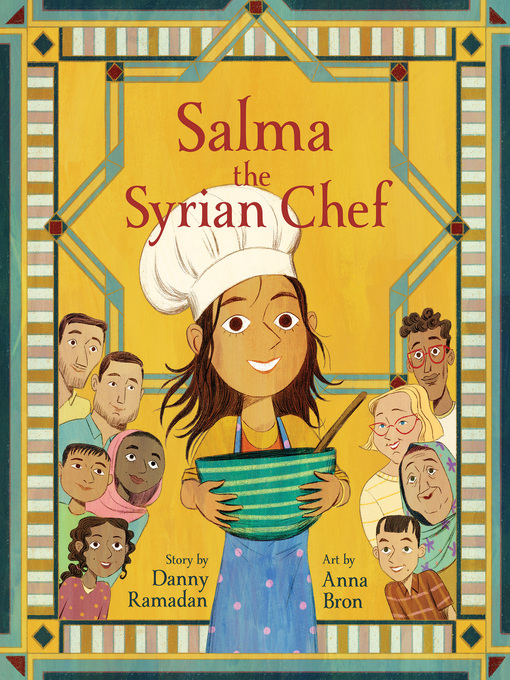Review by Booklist Review
Salma's Mama hasn't truly smiled since they left their Syrian refugee camp and separated from Papa. Hoping to cheer her up, Salma attempts to cook one of Mama's favorite dishes--foul shami, a sort of fava bean salad. With the help of a wonderfully diverse array of other Vancouver Welcome Center residents--kids from Egypt, India, Venezuela, Somalia; a Jordanian translat a gay Lebanese coup a Persian granny--Salma overcomes her rough English, a shortage of spices, and a broken bottle of olive oil before surprising Mama, who finally "breaks into a long, sweet laugh, like the echo of bells." In his picture-book debut, activist, author, and former refugee Ramadan builds a heartfelt story of culture, community, and love around the Syrian crisis. Grown readers will recognize Mama's quiet struggle to persevere, even as the story focalizes--appropriately--on Salma's endearing, somewhat naive tween perspective. Tight prose shines through poetic use of simile and a dedication to narrative, with Bron's art bringing the text's humanity to life, eking out so much emotion--Mama's fatigue; Salma's hope, frustration, and elation--through simple strokes of facial expression. The Vancouver setting is bright and colorful, and most illustrations come framed in geometric patterns, maintaining an Arabic aesthetic in this refugee family's new life. A jovial blend of food, family, and friends.
From Booklist, Copyright (c) American Library Association. Used with permission.
Review by Publisher's Weekly Review
Salma and her mother live in an apartment at a Vancouver Welcome Center, a home vastly different from their native Syria, where Salma's father still resides. When she thinks about him, "Salma's heart aches like a tiny fire in her chest." She notices, too, that her mother's characteristic laughter has disappeared since their move. After some brainstorming, Salma decides to make her mother a favorite Syrian dish. With help from the Welcome Center's community of refugees (a gay couple from Lebanon, people from Egypt, India, and Somalia), Salma translates a recipe, gathers ingredients, and--through some emotional trial and error--makes her mother a lovingly assembled foul shami that incites "a long, sweet laugh, like the echo of bells." Bron's angular illustrations, rendered in warm colors and patterns, depict the inclusive group, while Syrian-Canadian activist Ramadan writes with poetic immediacy about displacement, home, and family. Ages 4--7. (Mar.)
(c) Copyright PWxyz, LLC. All rights reserved
Review by School Library Journal Review
K-Gr 2--Salma lives with her mother in a refugee center in Canada, hoping her father will join them. Salma misses her father and the life in Syria, and struggles seeing how unhappy her mother is. Determined to hear her mother laugh again, Salma tries to cheer her up with silly drawings and jokes, "but all she gets is Mama's sad smile, full of love but empty of joy." Remembering the last time she saw her mother happy, Salma decides to surprise her by making foul shami, a Syrian meal her family shared in their lost home. Salma seeks the help of many other people in the refugee camp to find a recipe, translate the foods, shop, and prepare the meal, showcasing the things all the immigrants have in common as well as the variety and uniqueness of the cultures. Despite all the help, Salma doesn't have the right spices to finish her dish, and her frustration opens a floodgate for all her feelings of displacement and sadness. The meal, of course, delights her mother, and their friends at the camp join them with the missing ingredients. The charming illustrations are notably framed by Syrian mosaic patterns, providing a beautiful framework for the story. Realistically, the happy ending is limited to the connection with her mother and a dream of continued happiness with their new community; no easy answers about the future are provided. VERDICT Truthful, hopeful, and relatable; a first purchase.--Anna Haase Krueger, Ramsey County Library, MN
(c) Copyright Library Journals LLC, a wholly owned subsidiary of Media Source, Inc. No redistribution permitted.
Review by Kirkus Book Review
When Salma and her mom move from the refugee camp to Canada, they seem to leave joy behind with Papa. Back in the camp, her mom giggled with her friends all the time, but now, in Vancouver, she hardly laughs at all. They both miss Papa and hope he'll join them soon. Salma and her mom live in the Welcome Center with other newcomers. When she shares her quest to make Mama laugh with one of the helpers, Nancy suggests that Salma draw her good memories for inspiration. As Salma illustrates her home in Damascus and her parents eating a dish of foul shami, she has an idea! "I think Mama misses Syrian food….I want to make her foul shami." However, she doesn't know the recipe, let alone the English words for any of the needed vegetables. Setting many vignettes in an eight-pointed star-shaped frame, Bron fills the pages with careful detail and glimpses of different cultures and places, including Vancouver. At the Welcome Center, Salma and readers meet children from Egypt, India, and Venezuela; a translator from Jordan; a gay couple from Lebanon; and others from Canada, Somalia, and Iran. With creativity and help from friends, Salma moves ahead with her plan, but so many things go wrong. The story ends with a lovely surprise and, of course, a big laugh from Mama. This beautiful story grasps diversity, exploring resilience, love, friendship, and the meaning of home. (Picture book. 4-8) Copyright (c) Kirkus Reviews, used with permission.
Copyright (c) Kirkus Reviews, used with permission.

